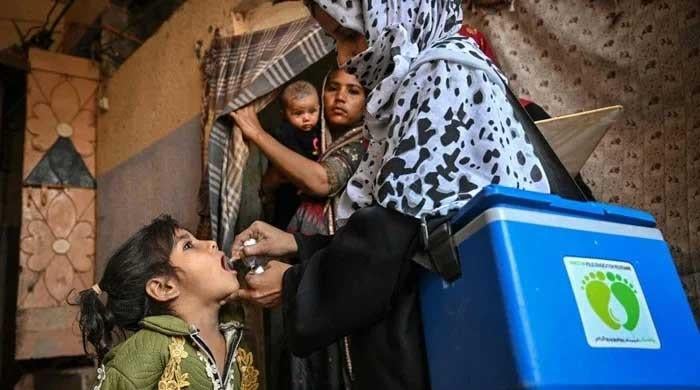 |
| Sindh Faces Vaccine Refusals: Over 35,000 Parents Decline Polio Vaccination for Their Children |
Sindh Reports Over 35,000 Vaccine Refusals Amid Anti-Polio Drive: A Growing Concern for Public Health
In a troubling development for public health in Pakistan, particularly in the Sindh province, reports indicate that over 35,000 parents have declined to vaccinate their children against the poliovirus. This alarming trend comes during a nationwide polio vaccination campaign, which aims to eradicate this debilitating disease that primarily affects children.
Understanding the Polio Vaccine and Its Importance
Polio, a highly infectious viral disease, can lead to paralysis and even death. The polio vaccine is crucial for safeguarding children against this illness. The Global Polio Eradication Initiative has made significant strides in reducing polio cases worldwide, yet vaccine refusals pose a serious threat to these efforts.
The Current Situation in Sindh
On February 3, 2025, a nationwide polio vaccination campaign was launched, coinciding with the alarming news of vaccine refusals in Sindh. Reports confirm that the majority of parents refusing the vaccine cite misinformation, cultural beliefs, and distrust in the healthcare system as their primary reasons.
Reasons Behind Vaccine Refusals
1. Misinformation and Myths: A significant factor contributing to vaccine hesitancy is the spread of misinformation regarding the vaccine's safety and efficacy. Many parents are influenced by false narratives circulated through social media and word of mouth.
2. Cultural Beliefs: In certain communities, cultural beliefs may discourage vaccination. Some parents may perceive vaccinations as unnecessary or harmful, leading to a reluctance to immunize their children.
3. Distrust in Healthcare Providers: Past experiences with healthcare systems can create distrust among parents. If they feel that their concerns are not addressed or if they have encountered systemic issues, they may refuse vaccinations altogether.
4. Accessibility Issues: In some cases, logistical challenges such as lack of access to vaccination centers or the inability to take time off work can contribute to vaccine refusals.
#
The Impact of Vaccine Refusals on Public Health
The refusal of vaccines poses a significant risk not only to the individuals who forgo vaccination but also to the community at large. When vaccination rates drop, it creates an environment where the poliovirus can thrive and spread. This can lead to outbreaks that endanger the health of vulnerable populations, particularly children.
#
Addressing Vaccine Hesitancy
Efforts to combat vaccine hesitancy in Sindh and other regions must focus on education and community engagement. Here are several strategies that could be employed:
1. Public Awareness Campaigns: Initiatives aimed at educating parents about the safety and importance of the polio vaccine can help dispel myths and misinformation. Engaging local influencers and community leaders in these campaigns can also enhance credibility.
2. Building Trust in Healthcare Systems: Strengthening the relationship between healthcare providers and communities is essential. This can be achieved by ensuring that healthcare workers are trained to communicate effectively and empathetically with parents.
3. Providing Accessible Services: Making vaccination services more accessible can reduce barriers for parents. Mobile vaccination units and flexible hours can cater to working families and those living in remote areas.
4. Involving Parents in Decision-Making: Engaging parents in discussions about vaccinations can empower them to make informed choices for their children. This participatory approach can help alleviate fears and encourage acceptance.
Conclusion
As Sindh grapples with over 35,000 vaccine refusals during a critical anti-polio campaign, it is imperative that effective strategies be implemented to address the root causes of vaccine hesitancy. Through education, community engagement, and improved access to healthcare services, we can work towards a future where every child is protected against polio. The fight against this preventable disease must continue, as the health of our children and communities hangs in the balance.
FAQs About Polio Vaccination in Sindh
Q1: Why is the polio vaccine important?
A1: The polio vaccine is crucial in preventing poliovirus infections, which can cause paralysis and potentially be fatal. Vaccination helps protect not only the individual child but also the broader community by contributing to herd immunity.
Q2: What are the common reasons for vaccine refusals?
A2: Common reasons include misinformation about vaccine safety, cultural beliefs, distrust in healthcare providers, and accessibility issues.
Q3: How can communities improve vaccination rates?
A3: Communities can improve vaccination rates by implementing public awareness campaigns, building trust with healthcare providers, increasing access to vaccination services, and involving parents in discussions.
Q4: What are the potential consequences of low vaccination rates?
A4: Low vaccination rates can lead to outbreaks of polio, putting unvaccinated children and the community at risk of severe health consequences.
Q5: How can I find more information about polio vaccination?
A5: For more information, you can consult local health authorities, visit the World Health Organization's website, or reach out to healthcare providers.
#
Tags
Health
